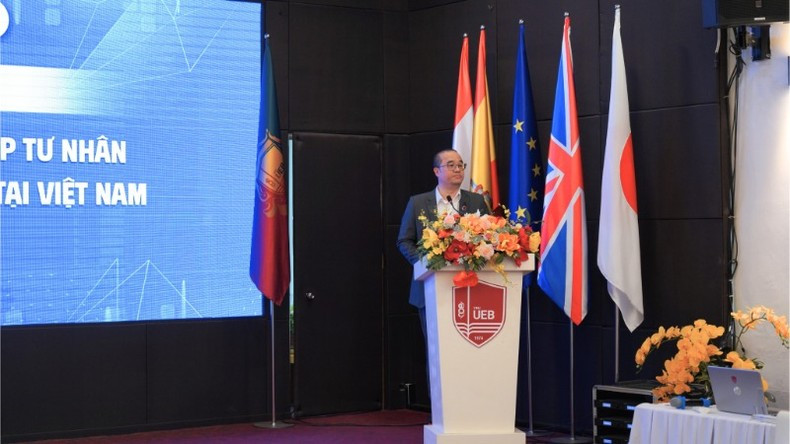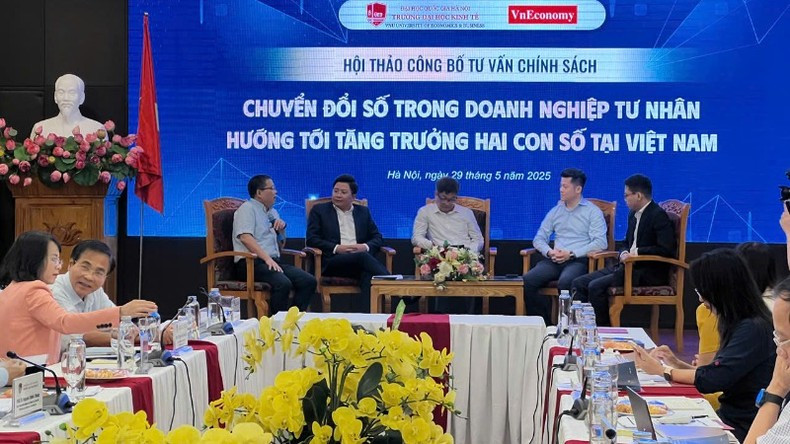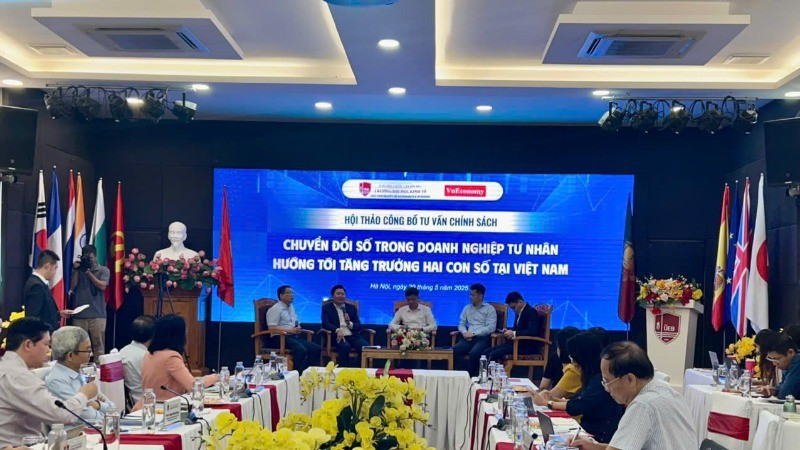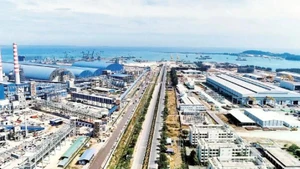Delivering the opening remarks at the workshop, Assoc. Prof. Dr. Nguyen Truc Le, Chairman of the University Council of the University of Economics under the Viet Nam National University, Ha Noi, emphasised that Resolution No.57-NQ/TW marks a breakthrough in science, technology, innovation, and digital transformation. Resolution No.68-NQ/TW of the Politburo represents a historic turning point, breathing new life into the private sector.
For private enterprises to develop and become the key driving force of Viet Nam’s economy they must undergo breakthrough development steps that are inseparable from science, technology, and digital transformation.
 |
| Assoc. Prof. Dr. Nguyen Truc Le, Chairman of the University Council of the University of Economics under the Viet Nam National University, Ha Noi, speaks at the conference. |
The conference aims to concretise the spirit and contents of the above two resolutions, while providing a forum for experts and guests to analyse practical challenges and propose policy recommendations and action models to help private enterprises undergo effective digital transformation and contribute to the goal of double-digit growth.
Assoc. Prof. Dr. Nguyen Hong Son, Deputy Head of the Party Central Committee's Commission for Policies and Strategy, stated that in the context of an accelerating global digital transformation, Viet Nam is facing unprecedented opportunities to leap forward, but also deep and complex challenges.
 |
| Assoc. Prof. Dr. Nguyen Hong Son, Deputy Head of the Party Central Committee's Commission for Policies and Strategy, speaks at the event. |
Dr. Hoang Xuan Vinh, a lecturer from the University of Economics under the Viet Nam National University, Ha Noi, delivered a presentation on digital transformation in Vietnamese enterprises. He noted that although business leaders are increasingly aware of the importance of digital transformation, they still lack concrete solutions. Foundational technologies such as data storage, microchips, and semiconductors in Viet Nam remain heavily dependent on foreign countries.
Based on a survey on digital transformation to promote enterprise participation in global value chains and supply chains, Assoc. Prof. Dr. Phan Chi Anh, Director of the Business Administration Institute, University of Economics, under the Viet Nam National University, Ha Noi, revealed that the level of digital transformation remains limited. Most enterprises have been undergoing digital transformation for 3–5 years, with solutions meeting only 60–70% of expected targets in production stages. Major challenges include funding constraints, technological risks, and cybersecurity issues.
His statistical analysis indicates that enterprises with a higher level of digital transformation enjoy lower business costs, shorter delivery times, and lower inventory levels.
 |
| Assoc. Prof. Dr. Phan Chi Anh, Director of the Business Administration Institute, University of Economics, speaks at the event. |
The conference highlighted that the private sector — a key engine of growth — is now faced with an urgent need for digital transformation to avoid falling behind, whereby well-planned, digital transformation can serve as a “new operating system” for growth, innovation, and integration.
Currently, Viet Nam’s private sector includes over 940,000 businesses and more than 5 million individual business households, contributing nearly 50% of GDP, accounting for over 30% of total state budget revenue, and employing up to 82% of the national workforce.
During the discussion session, experts pointed out technological bottlenecks faced by enterprises. These include lack of capital, limited technological manpower, underdeveloped infrastructure, inflexible institutions, and notably, significant disparities in digital transformation awareness and readiness among different types of businesses.
 |
| Discussion panel at the conference. |
Nguyen Kim Hung, Vice Chairman of the Viet Nam Association of Small and Medium Enterprises (SMEs), emphasised that Vietnamese SMEs still face limitations in financial capacity, technology, and high-quality human resources.
Dr. Hoang Xuan Vinh identified a lack of data infrastructure, shared systems, and digital connectivity as major issues in Viet Nam’s digital transformation process.
“To resolve these bottlenecks, Singapore has introduced several initiatives encouraging SMEs to adopt digital solutions. These initiatives provide SMEs with access to digital tools and resources, helping them improve operational efficiency and better serve customers. This could serve as a valuable reference for Viet Nam, where the government’s role in supporting enterprises is crucial,” said Dr. Vinh.
Assoc. Prof. Dr. Phan Chi Anh proposed several policy recommendations, including investment in national digital infrastructure (5G networks, cloud computing, data centres), the development of shared digital platforms for SMEs in areas such as accounting, e-commerce, and supply chain management, and the creation of a clear legal framework for e-commerce, digital transactions, and electronic contracts.
 |
| Assoc. Prof. Dr. Pham Thi Hong Yen, Standing Member of the National Assembly’s Economic and Financial Committee. |
In her capacity as a standing member of the National Assembly’s Economic and Financial Committee, Assoc. Prof. Dr. Pham Thi Hong Yen noted that the 9th session of the 15th National Assembly will deliberate and pass 40 laws and resolutions with groundbreaking reforms. Without digital transformation, it will be difficult to handle the enormous workload following institutional streamlining. For businesses, she affirmed that digital transformation directly affects revenue and costs, ultimately boosting profits. It is also a key factor in achieving the goal of double-digit growth in the future.
















